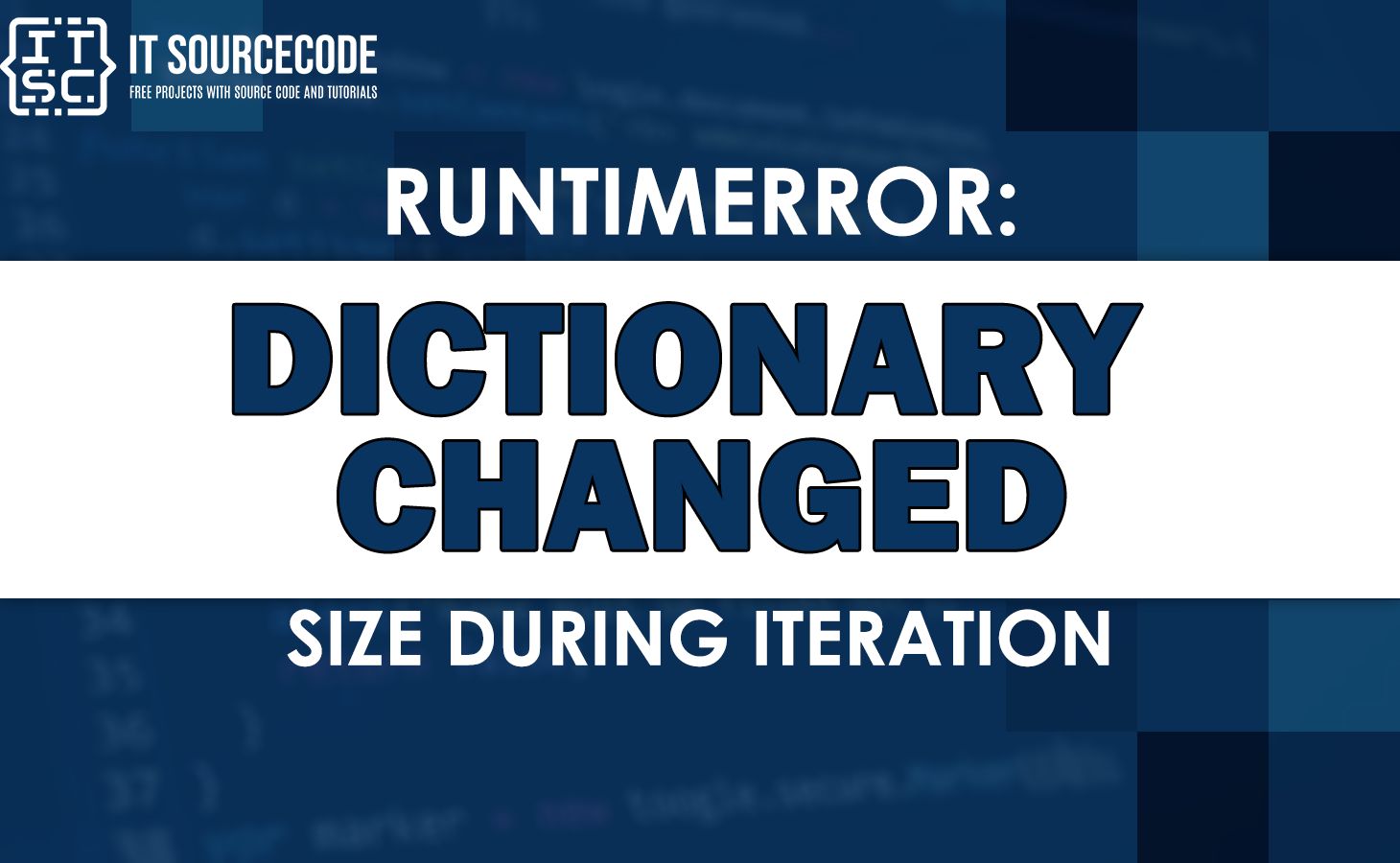The Runtimeerror: dictionary changed size during iteration typically occurs if we are attempting to change the size of the dictionary while iterating over it.
This type of error is an exception error which occurs if the generated error doesn’t fall into any other categories. However, this error can be fixed by the handlers which handle exception clauses.
What is the RuntimeError: dictionary changed size during iteration error?
The runtimeerror dictionary changed size during iteration error usually occurs if we attempt to add or remove items from a dictionary while iterating over it.
This causes the size of the dictionary to modify, which can lead to unstable performance and it will cause the iteration to fail.
For example:
my_dict = {"a": 1, "b": 2, "c": 3}
for key in my_dict:
if key == "b":
my_dict.pop(key)Output:
Traceback (most recent call last):
File “C:\Users\Joken\PycharmProjects\pythonProject6\main.py”, line 3, in
for key in my_dict:
RuntimeError: dictionary changed size during iteration
Common Causes of the Error
Here are the common causes of the error:
- Adding or removing items from a dictionary while iterating over it.
- Using multiple threads or processes.
- Modifying a dictionary while it is being used as a key in another dictionary.
How to solve the dictionary changed size during iteration error?
The following solutions below to solve the dictionary changed size during iteration:
Solution 1: Use a Copy of the Dictionary to Solve the Error
The first solution to avoid this error is to make a copy of the dictionary and iterate over the copy instead of the original dictionary. Furthermore, any changes made to the copy will not affect the original dictionary.
For example:
d = {'a': 1, 'b': 2, 'c': 3}
for key, value in d.copy().items():
if key == 'b':
d.pop(key)
print(key)
Output:
b
Solution 2: Use a List Comprehension to Solve the Error
Another solution to avoid the error is to use a list comprehension to create a new dictionary. In this method, you can change the original dictionary without causing any problems.
For example:
list = {'a': 1, 'b': 2, 'c': 3}
list = {key: value for key, value in list.items() if key != 'b'}
print(list)Output:
{‘a’: 1, ‘c’: 3}
Solution 3: Use a Temporary List to Solve the Error
You can also use a temporary list to store the items you want to remove from the dictionary and then delete them after the iteration is complete.
For example:
temporary_list = {'a': 1, 'b': 2, 'c': 3}
to_remove = []
for key, value in temporary_list.items():
if key == 'b':
to_remove.append(key)
for key in to_remove:
del temporary_list[key]Solution 4: Use Deferred Update to Solve the Error
The last solution to solve this error is to Use Deferred Update. This method will prevent any changes made during the coding from being applied to the database till the iteration is over.
For example:
my_dict = {'key1': 1, 'key2': 2, 'key3': 3, 'key4': 4}
keys_to_remove = []
for key in my_dict:
keys_to_remove.append(key)
for key_to_remove in keys_to_remove:
del my_dict[key_to_remove]
FAQs
Yes, you can modify a dictionary while iterating over it in Python, but you need to be careful not to change its size. If you do change the size of the dictionary, you may encounter the RuntimeError: dictionary changed size during iteration error.
The best way to iterate over a dictionary in Python is to use a for loop with the items() method, which returns a list of key-value pairs in the dictionary. You can then access each key and value in the loop body and perform any necessary operations.
No, this error is specific to dictionaries in Python. Other data structures like lists or sets do not have this issue.
Additional Resources
Here are the following articles to understand more about Python RuntimeError:
- runtimeerror: cudnn error: cudnn_status_not_initialized
- Runtimeerror: cuda error: invalid device ordinal
- Runtimeerror: couldnt install torch
- Runtimeerror: cuda error: device-side assert triggered
Conclusion
In conclusion, the “RuntimeError: Dictionary Changed Size During Iteration” error is a common error in Python that occurs when you try to modify a dictionary while iterating over it.
To avoid this error, you can use a copy of the dictionary, a list comprehension, or a temporary list to store the items you want to remove from the dictionary.

